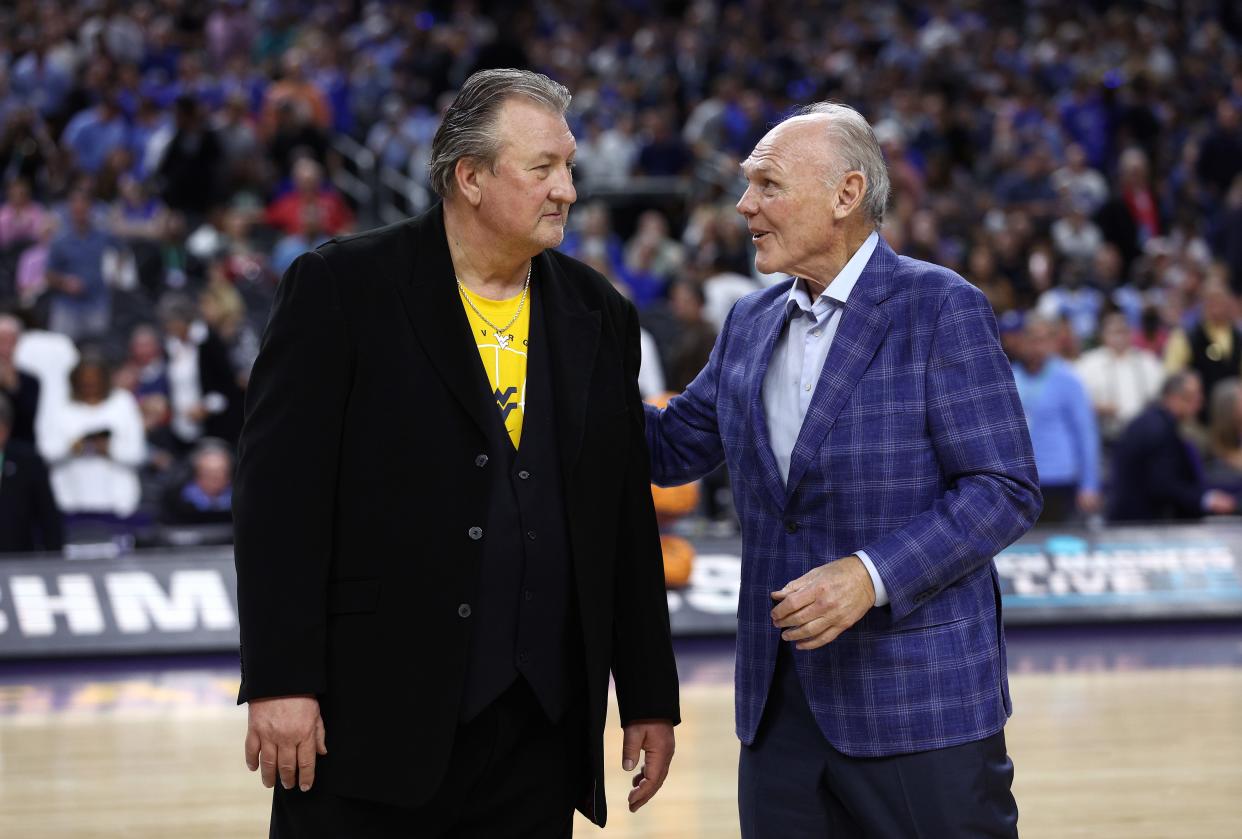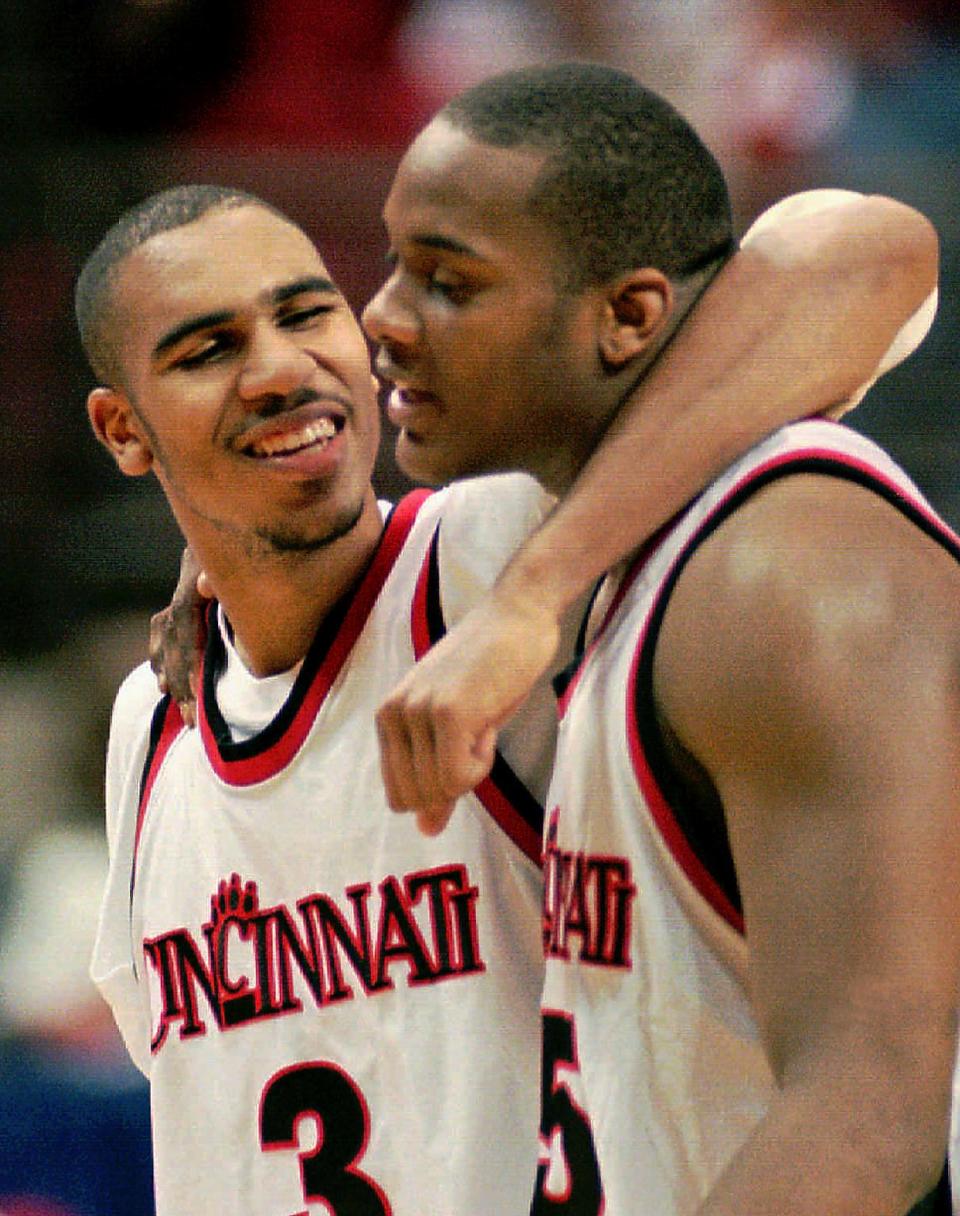Bass: The book on Hall of Fame coach Bob Huggins – our Cincinnati story
- Oops!Something went wrong.Please try again later.

Bob Huggins was named to the Basketball Hall of Fame, and I am thrilled for the man who for a year took me into his world and onto his bench so I could better tell his story.
I wrote the book on Bob Huggins.
With Bob Huggins.
I have never said much publicly about the experience.
“Bob Huggins: Pressed for Success” was his biography, and I was honored to help. But now he is in the Hall of Fame, and I recently wrote about loyalty and values in sports, and this is a story that intertwines the importance of both, for Huggins and for me.
I earned Huggins’ loyalty and then apparently lost it.
******
Bob Huggins seemed the perfect biography subject.
Here was this enigmatic success who could scream at his players on the court and claim to befriend them off it. His methods were questioned by those who were not close enough to him to understand him – much less hear him. He conducted interviews in a barely audible monotone, looked like he was trying not to wake his face.
Who was this guy? Why couldn’t he smile? And why would players choose him and the University of Cincinnati when plenty of other coaches seemed less volatile?
More: Bass: What excites you about Reds? ‘Nothing!’ Are you sure?
More: Bass: What if Deshaun Watson were the best choice for the Bengals? Would you embrace it?
Ron Grinker, Huggins’ attorney, said I needed to spend a lot of time around the program, sitting on the bench for home games and attending practices when I could.
“He needs to know he can trust you and that you see what he is doing,” Grinker told me.
For Huggins to feel comfortable sharing his story, he would need to be comfortable with me. Just about anywhere he and his assistants went, I could go. I adjusted my work schedule, which he appreciated. He invited my two young sons and me to sit on the bench for Midnight Madness, which I appreciated.
We were learning to trust each other.
******
We drove together to see a recruit. This is when I learned that riding shotgun with Bob Huggins can be a bit of a thrill ride, which others would confirm later. While we talked, he constantly fiddled with the radio to find sports news or sports talk, or sipped on a diet Dr. Pepper, or changed lanes, restless to get where we needed to go.
We were not alone in the group on this up-and-back trip, and I was told the NCAA rules of engagement, which we followed. When you are around Huggins, you know he is smart, smart enough to know the rules and how to push them to the limits, but not worried about pushing himself too much. Nobody will outwork him. Ever.
He enjoys people more than you might imagine, and they enjoy him. I saw this a lot in our time together. He smiles easily, sits back comfortably, talks to the people he can, building relationships or reconnecting with friends, talking basketball and telling basketball stories, talking one person to another. He is not a salesman. He doesn’t do phony. He dislikes phony. When he smiles, he means it.
I was invited to smoke cigars with Huggins and the rest of our group that night. I am not a big cigar guy, but I appreciated what the invitation meant, so I said yes. He did this for me, and I did this for him. It was a late night, but worth it.
The next day at practice, Huggins asked me how I was, knowing I had not slept much, either.
“Great,” I said, “but I can’t get the taste of that cigar out of my mouth.”
He laughed.
We bonded.
******
The voice in press conferences is not an act of disdain for the media. It is not an act at all. When we talked in his office for the book, Huggins’ voice barely registered on tape at first; he agreed to speak up and hold the recorder nearer his mouth. He said he was so quiet as a kid that his parents never thought he could address an audience. He just got used to it. This is the After picture.
It is not the camera-ready affect people more easily embrace and trust. It is just him.
In press conferences, Huggins can show a bit of emotion when criticizing his players’ effort – but more toward any reporter who dares ask about that effort, which sends Huggins into a passionate defense of his players. Does this seem irrational? He doesn’t care. This is strategy. He sees himself as a big brother able to criticize a little brother, but nobody else can. To him, this builds loyalty.
More: Bass column: How much pain can a Cincinnati Reds fan take?
A media member joined us once in Huggins’ office, to interview the coach – then turned off his recorder and turned on me. I had mentioned this interviewer in a piece about a sports figure he had defended, and he didn’t like it. Huggins stepped in, good-natured, offering to tell a story about that figure ... one that silenced the interviewer. Huggins was defending me without having to say a word about me. Loyalty means a lot to him. To me, too.
******
Access meant witnessing moments Huggins could address for the book, or just for my understanding.
After a nightmare game, he brought the team into the locker room to watch tape of it at the next practice. He hated the effort in that game, and a Huggins team is all about effort. It is not about trying hard. It is about learning that you can try harder than you even knew you could. He was frustrated, irate. The players sat silently, some with towels over their heads. Huggins kept turning to assistant coach Jon Loyer, using him to make a point.
HUGGINS: “Jon, is it me, or haven’t I told these guys every single day to rebound on the opposite side of the basket after a shot?”
LOYER: “You have, Huggs.”
HUGGINS: “Jon, look at that effort. Have you seen a lazier bunch in your life?”
A former Bearcat told me players sometimes would wear towels over their heads during such times to keep Huggins from seeing them laughing. Nobody laughed this time.
Sometimes, players can yell back at Huggins as passionately as he yells at them. Sometimes, this happens in games. Outsiders see a team as out of control as its coach. The players understand that Huggins allows somewhat of a free exchange, until he says no, and that day in the locker room was a “no” day. He does care about what they have to say, and he does care about them.
When Huggins is not coaching or teaching his players, he is laughing with them, and they will kid him. He speaks softly. They love “Huggs.” They are his friends, until it is time not to be friends. Outsiders don’t understand that, either, but the players do. Everyone has a role. He can yell at officials, but that doesn’t mean they can.

During the 1995 NCAA Tournament, Danny Fortson complained to official Don Rutledge about a no-call, and Rutledge told him to get on and play. Huggins told Rutledge, “I just want to tell you this might be the last time you hear me say this in this game, but I agree with what you just said 100 percent.” Rutledge smiled and said, “Thanks, Coach.”
Who would have thought Huggins could joke with officials? This was one of the advantages of being on the bench. So was watching him coach. Once, when Huggins was diagramming a play, I wondered how Fortson could follow it; he has dyslexia. I asked Huggins about this later. He said people learn differently. Some by seeing. Some by hearing. Some by doing. The Bearcats had practiced the play so many times, Fortson would know exactly what to do. I never forgot that. It is a concept I later heard other great teachers, coaches and leaders use.
******
I am proud of the work we did on his book. I enjoyed our time together and came to a better appreciate for the man and his program. He was open and kind. At book signings, he wanted to make sure I signed, too, always apologizing if he forgot to pass one to me. Finally, I looked at him, smiled, and, doing my best Huggins voice, said, “That’s why we’re not as good anymore. We make excuses.” He looked at me, realized what I was doing and laughed.
There were times we disagreed. We have different views on a lot of things, and that is OK. While I got to know him better than I ever had imagined, and learned more about basketball than the rest of my life combined, I know there were sides of each other we still were learning.
More than anything, I learned why people are so loyal to him. It is because he is so loyal to them. Of course, players want to play for their coach/big brother/friend.
And I know I violated his definition of loyalty.
The reporting my writer later did – and I encouraged – about NCAA violations at UC pulled us apart. Huggins and his team stopped talking to the writer for a while, to punish us. The reporter was investigating what so many people wanted to know, why Huggins was not implicated for the so-called smoking gun – players reportedly using his access code for (then-costly) long-distance calls.
I could not imagine Huggins giving out such information.
Our reporter learned that several access codes had been used by players, that UC accused a student-manager of providing one code, and that other codes might have been too easily accessible or passed around because they hadn’t been changed for years.
I was proud of our reporter and would have backed his reporting either way, proud to give you the answers you want because I value good journalism, and proud my faith was merited in Huggins, whom I also value.
This was my version of loyalty.
Huggins and I have not spoken since then, although I have left two or three messages over the years. I am sad about that. I am not here to judge everything he said and did at UC. My sense was, he wanted to make an impact on these players, in basketball and in life, and maybe he was too trusting or lenient or forgiving with some he allowed in the program. Maybe the rest of the world needed to see the good he was trying to do, and maybe he needed to see what the rest of the world did. I do know he didn’t take care of himself the way he should. I care.
I still feel a sense of loyalty to him and always cheer for him at West Virginia.
And I am thrilled for Bob Huggins for making the Hall of Fame.
Email Bass at mbass@mikebasscoaching.com or reach out to him @SportsFanCoach1 on Twitter if you want to be included next week. His website is MikeBassCoaching.com.
This article originally appeared on Cincinnati Enquirer: Mike Bass on former UC Bearcats basketball coach Bob Huggins and his being elected to the Basketball Hall of Fame

